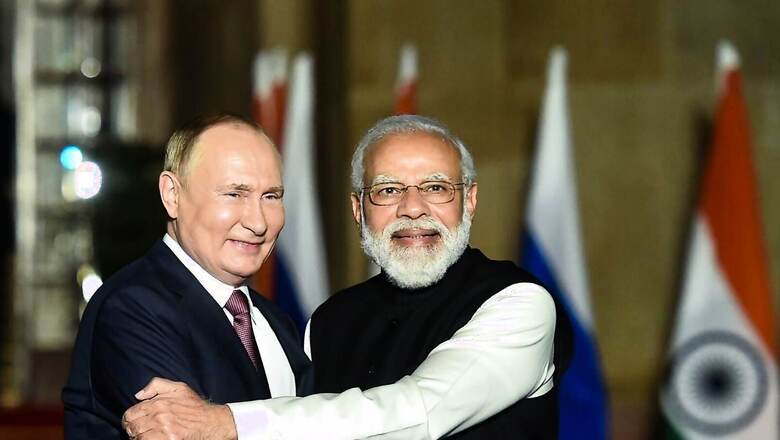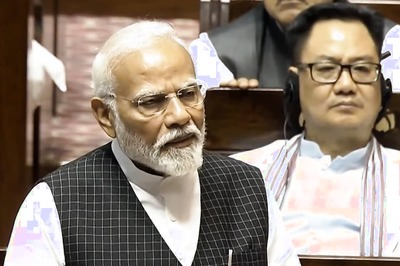
views
Tackling China in Eastern Ladakh was the biggest immediate concern with which India stepped into 2021. The friction was over six months old by then. India had warned Beijing of an adverse impact on the overall bilateral relations due to the ongoing tension. Eight rounds of Corps commander-level talks and almost an equal number of diplomatic-level talks had taken place by the end of 2020 but to no avail.
The first breakthrough came in February 2021. Out of the over five friction points, the two sides agreed to disengage at Pangong Lake. In his statement in Parliament, defence minister Rajnath Singh said, “Disengagement in the Pangong lake area envisages that both sides will cease their forward deployments in a phased, coordinated and verified manner… These are mutual and reciprocal steps and any structures that had been built by both sides since April 2020 in both the North and South Bank area will be removed and the landforms will be restored.”
However, this development did not ensure a swift follow-up on other friction points. The build-up of troops on the Line of Actual Control (LAC) remained and there were no signs of de-escalation. With a stubborn China indicating that it would brazen it out, the first-ever QUAD summit, though virtual, came as a welcome counter for India.
The-then new US President Joe Biden, who too wanted to keep the pressure on China like his predecessor Donald Trump, not only ensured the first summit in March but also a follow-up with an in-person meet in Washington DC in September.
However, between the two summits came the announcement of a military alliance AUKUS between the United States (US), United Kingdom (UK) and Australia and the chaos and collapse of Afghanistan with the military pull-out by America.
It is these two events, and largely the latter, that made India once again bring back its focus on the relationship with its old and trusted ally, Russia.
First, let’s break down the role of AUKUS in the possible strategic rebalancing. In a surprise announcement on September 15, the White House said that as part of the effort to maintain security and defence cooperation in the Indo-Pacific, “we are announcing the creation of an enhanced trilateral security partnership called ‘AUKUS’ — Australia, the United Kingdom, and the United States.”
In a move that greatly miffed France, the White House read-out also added, “We will leverage expertise from the United States and the United Kingdom, building on the two countries’ submarine programs to bring an Australian capability into service at the earliest achievable date.” The announcement of Australia getting nuclear-powered submarines under AUKUS meant that the France-Australia diesel-electric sub deal fell through. This sparked a parallel diplomatic stand-off with French President Emmanuel Macron deciding to ask the American and Australian envoys to leave.
For India too, the announcement came as a bit of a surprise – and it was mostly the timing – barely a week before the first in-person QUAD meeting. As a result, questions were raised about whether it diluted the QUAD. India dismissed these observations with foreign secretary Harshvardhan Shringla explaining that “QUAD and the AUKUS are not groupings of a similar nature”.
He said the QUAD has adopted a positive proactive agenda. “This includes dealing with the Covid-19 pandemic, including the supply of vaccines to the Indo-Pacific region, it includes working on new and emerging technologies, it includes working on issues like climate change, infrastructure, maritime security, education, humanitarian assistance and disaster relief.” On the other hand, he added that the AUKUS was a security alliance between three countries. As per the ministry of external affairs, from India’s perspective it was neither relevant to the QUAD nor will it have any impact on its functioning.
The analysis by experts was also split. Some were of the clear view that the QUAD was undermined with the announcement of AUKUS, leaving it toothless in countering China. Others believed that it would help India as it need not be part of a military alliance against China that would irk Beijing further. However, the emergence of AUKUS certainly put a question mark on how proactively India would be supported in countering China henceforth.
Secondly, the fall of Kabul and the rise of the Taliban as the US left in a hurry most certainly forced India to up its engagement with Russia in 2021. As former US President Donald Trump started to press for an exit from Afghanistan, India had been conveying to the United States the possible security fallout in the region of any such move. However, America was actively negotiating a deal through Pakistan with the Taliban. This culminated in President Biden setting a date for America’s swansong in Afghanistan as August 31.
While all sides continued to believe that the Afghanistan government wouldn’t fall, the rapid pace of the Taliban takeover proved everyone wrong. It came as bad news for India since it had been unable to establish any top-level communication with the Taliban yet. Within days, it appeared, India’s $3 billion investment in the country over the last two decades was reduced to nothing. Moreover, an emerging Pakistan stranglehold over the Taliban government has India worried.
Here’s where old ally Russia, which had been in touch with the Taliban but also wary of a security fallout in the region, came into play. The Russian NSA travelled to India twice over a period of two months. Nikolai Patrushev travelled to India to meet his counterpart Ajit Doval in early September. He came again in November to attend the Regional Security Dialogue hosted by India in which the crucial central Asian countries too participated.
Capping this off was a short but very significant visit by Russian President Vladimir Putin himself. Putin travelled to India for precisely six hours but this was his only visit abroad in the last year and a half since the pandemic broke out. The only other time he left Russia was for a meeting with US President Joe Biden in Geneva.
President Putin himself mentioned in his opening statement that he was concerned about terrorism and drug trafficking, including in the context of the situation in Afghanistan. The foreign secretary said, “They decided to continue close consultation and coordination between India and Russia on the situation in Afghanistan, including for a peaceful, secure and stable Afghanistan with an inclusive government that represents all sections of society. Both sides were also very clear that Afghanistan territory should not be used for sheltering training or planning, financing any acts of terrorism.”
However, the thrust of the visit seemed to be on defence equipment sales. Despite the threat of the US imposing CAATSA (Countering America’s Adversaries Through Sanctions Act), India has stood by its S-400 missile defence system deal with Russia. The first of the deliveries has started. By sealing more deals like the manufacture of six lakh AK-203 assault rifles with technology transfer from Russia over ten years, India has sent a two-pronged message to another strategic partner, the US, as well. Not only will it maintain sovereignty over defence purchases but will continue to balance relations between old friends and new.
Read all the Latest India News here

















Comments
0 comment